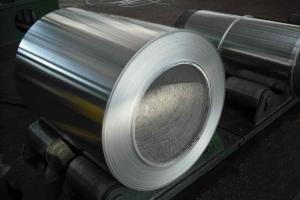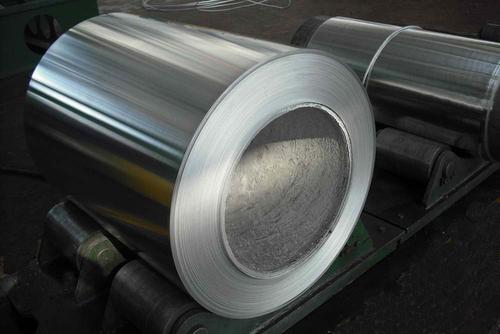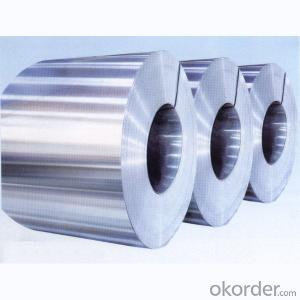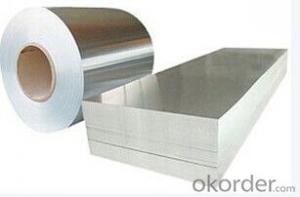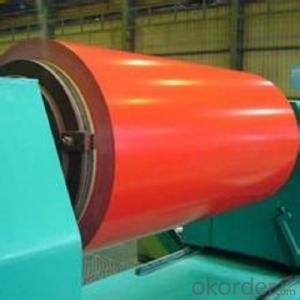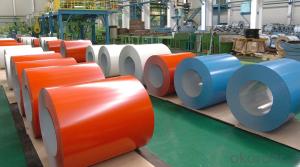Anodized AA1060 Aluminium Coil
- Loading Port:
- China Main Port
- Payment Terms:
- TT OR LC
- Min Order Qty:
- -
- Supply Capability:
- -
OKorder Service Pledge
OKorder Financial Service
You Might Also Like
Specifications
2000 MTS stock with a complete range of specification
aa1060 aluminum sheet coil
Reasonable price, quickly delivery
Specification | Name: 1000 series aluminum coil | |||||||||||
Alloy: 1050, 1060, 1100, 1200 etc. | ||||||||||||
Temper: O, H12, H22, H14, H24, H26, H18 etc. | ||||||||||||
Thickness: 0.2-5mm | ||||||||||||
Width: Up to 1800mm | ||||||||||||
Weight: 5-6 tons per coil | ||||||||||||
Surface treatment: mill finished, anodized, embossed, PVC coated | ||||||||||||
Feature | Price is much more competitive than that of other series. | |||||||||||
Satisfy regular industrial process of stamping, drawing with good elongation, tensile strength and high formability. | ||||||||||||
Great plasticity, corrosion resistance, electrical conductiviy and termal conductivity. | ||||||||||||
Easy to be welded. | ||||||||||||
Easy to be pressure processed, extended and bent. | ||||||||||||
Application | Sign board, Advertising board, Building decoration, Car body, Cooking utensil, Lamp holder, Fan leaf, Electrical part, Chemical instrument, Machined part, Deep-drawn or spinned part, Welded part, Heat exchanger, Clock surface, Decotation, Reflective instrument etc. | |||||||||||
- Q: How are aluminum coils used in the production of electronic devices?
- The production of electronic devices heavily relies on aluminum coils, which perform a crucial role. When it comes to manufacturing the internal components of electronic devices like transformers, inductors, and electromagnets, aluminum coils are the go-to material. These coils are formed by winding aluminum wire around a core, creating a compact and efficient conductor for electrical currents. Transformers make use of aluminum coils to transfer electrical energy between circuits. By utilizing electromagnetic induction, these coils allow for voltage transformation. When a varying current flows through one coil, it induces a voltage in another coil. This process is essential in adjusting voltage levels, ensuring efficient power distribution in electronic devices and electrical systems. Inductors, another vital component in electronic devices, are constructed using aluminum coils. These coils resist changes in electrical current and store energy in their magnetic field. Aluminum coils possess low resistance, high conductivity, and the ability to handle high-frequency currents, making them perfect for inductor applications. They find their use in various electronic devices like power supplies, speakers, and filters to control current flow and regulate voltage. Furthermore, aluminum coils are utilized in the production of electromagnets, which are widely employed in electronic devices. The creation of electromagnets involves passing an electric current through a coil to generate a magnetic field. Aluminum coils are preferred due to their lightweight nature and excellent thermal conductivity, enabling efficient dissipation of heat in high-power applications. Moreover, the use of aluminum coils in electronic devices brings several advantages such as cost-effectiveness, lightweight construction, and excellent electromagnetic properties. Aluminum's lightweight characteristic allows for the production of compact and portable electronic devices, enhancing convenience for users. Additionally, its high thermal conductivity ensures efficient heat dissipation, which is critical in preventing overheating and maintaining proper functionality of electronic devices. In conclusion, aluminum coils find extensive usage in the production of electronic devices, serving various applications like transformers, inductors, and electromagnets. Their exceptional electrical conductivity, lightweight construction, and thermal conductivity make them an ideal choice for achieving efficient and reliable performance in electronic devices.
- Q: How are aluminum coils protected from damage during transportation?
- Aluminum coils are protected from damage during transportation through various measures such as using protective packaging materials like plastic or wooden crates, securing them with straps or bands to prevent movement, and using padding or cushioning materials to absorb shocks and vibrations. Additionally, coils may be wrapped in protective films or coated with anti-corrosion agents to safeguard them from environmental elements during transit.
- Q: How does aluminum ingot be processed to aluminum coil (aluminum sheet)?
- This depends on what aluminum ingot is. Small ingot needs to be casted into big one by putting into the melting furnace, and then be rolled to aluminum coil through rolling mill.
- Q: What is the acceptable range of temperatures for aluminum coils in terms of their functionality and durability?
- <p>The temperature range for aluminum coils can vary depending on the specific application and alloy type. Generally, aluminum coils can operate effectively within a range of -200掳F to 500掳F (-129掳C to 260掳C). For most industrial applications, the working temperature is between -40掳F to 300掳F (-40掳C to 150掳C). However, it's important to consult the manufacturer's specifications for the exact temperature limits of a particular aluminum coil, as these can differ based on the alloy and intended use.</p>
- Q: How are aluminum coils protected against transportation damage?
- Aluminum coils are protected against transportation damage through various measures such as packaging them in sturdy materials like wooden crates or steel frames, securing them with straps or bands to prevent movement, and adding cushioning materials like foam or airbags to absorb shocks and vibrations during transportation. Additionally, protective films or coatings may be applied to the surface of the coils to safeguard them against scratches or abrasions.
- Q: What precautions should be taken when operating a welding torch on aluminum coils to ensure safety?
- <p>When using a welding torch with aluminum coils, it's crucial to follow safety measures to prevent accidents and ensure a safe working environment. Always wear appropriate personal protective equipment (PPE), including heat-resistant gloves, safety glasses, and a welding helmet. Ensure the work area is well-ventilated to avoid inhaling fumes. Use a backdraft hood or fume extraction system to capture and remove welding fumes. Keep the work area clean and free of flammable materials. Regularly inspect the torch for any damage or wear. Use the correct type of welding rod for aluminum and ensure the gas supply is compatible with aluminum welding. Never leave a lit torch unattended and always follow the manufacturer's guidelines for safe operation.</p>
- Q: Can aluminum coils be formed into different shapes?
- Yes, aluminum coils can be formed into different shapes through various processes such as bending, rolling, or stamping.
- Q: where's the best place to look for aluminum not cans
- TRY A LOCAL HARDWARE STORE
- Q: Is it possible to utilize aluminum coil as a conductor for speaker wires?
- <p>While it is technically possible to use aluminum coil as speaker wire, it is not recommended. Aluminum has higher resistance and lower conductivity compared to copper, which is the standard material for speaker wires. This can result in signal loss and reduced sound quality. Copper is preferred due to its superior electrical conductivity, ensuring minimal signal degradation over distance. For optimal audio performance, it's best to use speaker wire made from high-quality copper or copper-clad aluminum.</p>
- Q: Is it possible to use a welding torch for joining steel coils?
- <p>Yes, you can use a welding torch to weld steel coils together. However, it's important to choose the right type of welding process suitable for the specific steel grade and the desired strength of the joint. Common methods include gas metal arc welding (GMAW), shielded metal arc welding (SMAW), and flux-cored arc welding (FCAW). Ensure you follow safety protocols, use appropriate protective gear, and have a good understanding of the welding process to achieve strong, reliable welds.</p>
Send your message to us
Anodized AA1060 Aluminium Coil
- Loading Port:
- China Main Port
- Payment Terms:
- TT OR LC
- Min Order Qty:
- -
- Supply Capability:
- -
OKorder Service Pledge
OKorder Financial Service
Similar products
Hot products
Hot Searches
Related keywords
